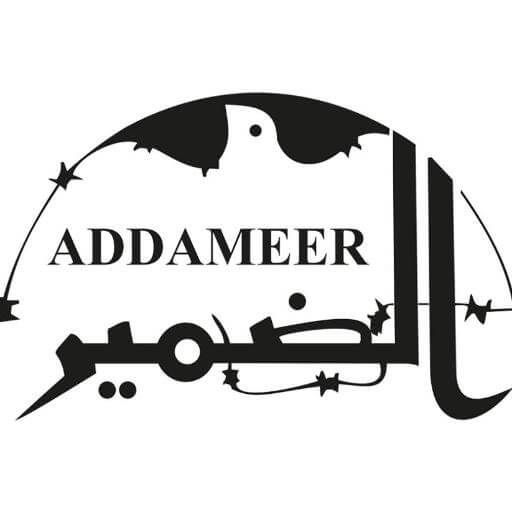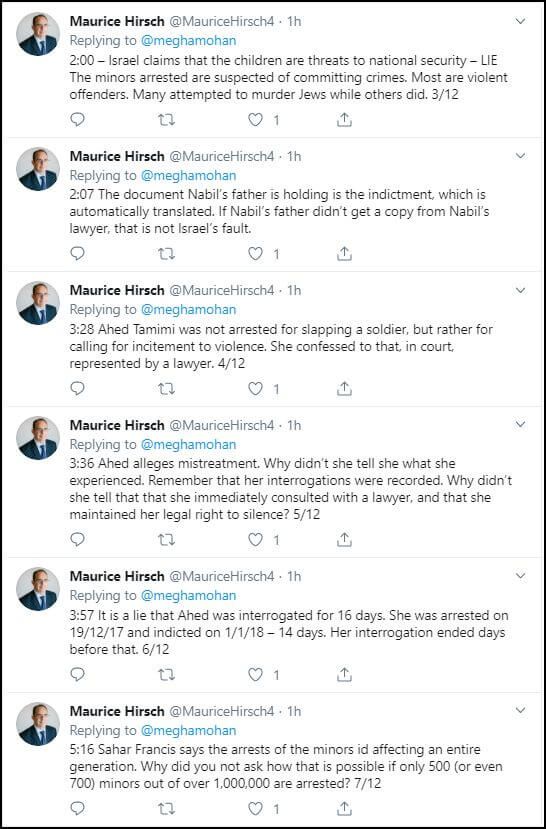Palestinian children are consistently used and abused in the service of the Palestinian cause both for terror activities and more widely for propaganda purposes.
The BBC has released an 11 minute video titled “Diaries of childhood in Israeli military detention.” You’d think that Palestinian children are spending their entire childhoods under lock and key. But since when did the BBC shy away from producing anti-Israel propaganda on behalf of the Palestinians?
We are introduced to three young Palestinians, one of whom is a familiar face – Ahed Tamimi.
Ahed Tamimi: the Palestinian poster child
While the BBC shows footage of Tamimi attacking an IDF soldier, for which she spent eight months in an Israeli prison, it fails to give any real background on the Palestinian poster girl for terror. For the real tragedy is not Tamimi’s experience with the Israeli military court system (what the BBC terms a “childhood”).
Ahed Tamimi’s entire childhood has been spent in an environment permeated with Palestinian terrorism: terror in which her family has long played an active and prominent role. For example, Ahed’s aunt helped plan the horrific Sbarros Pizza restaurant bombing, and her mother posted anatomically precise tutorials on how to most effectively stab Israelis.
Ironically, this very terrorism is the reason Israel has security measures in the first place.
Related reading: Ahed Tamimi’s Global Propaganda Tour
Since childhood Ahed has learned from her family that all of Israel is occupied Palestinian land, including Tel Aviv, and that she must fight to gain all of it. Hardly a path to peace. And Ahed’s family have placed her personally in danger over and over, for the benefit of cameras.
Her appearance for the BBC is just the latest in a global propaganda tour, milking her iconic status.
This, however, is the real Ahed Tamimi that you won’t see on the BBC:
Only towards the end of the film does it state:
The Israeli Military told the BBC that Ahed Tamimi accepted a plea deal for a number of charges.
It doesn’t say what those charges ultimately were: the assault on the officer caught on film, incitement and two prior instances of disrupting IDF soldiers. For the BBC, however, it was merely the “slap that made global headlines” that cost Tamimi eight months in prison.
Join the fight for Israel’s fair coverage in the news
A victim of a military court
But Tamimi isn’t the only Palestinian female ‘icon’ appearing on the BBC. Malak Al-Ghalith is lauded in the Palestinian community as the youngest Palestinian female to spend time in an Israeli jail at the age of 14. While the BBC acknowledges that she was arrested for an alleged attempted knife attack on Israeli soldiers at a checkpoint, that’s where the background context ends.
Al-Ghalith is treated as a victim of the Israeli military court system with no further questions posed as to the event that led to her arrest or even the incitement in Palestinian society that encourages children as young as 14 to carry out terror attacks.
What does it say about the BBC that it appears to whitewash terrorism?
The BBC deliberately muddies the legal waters
Instead, Israel stands accused as
the only country in the world where children are prosecuted through a dedicated military court system. Israeli military law is applied to Palestinian children in the West Bank because it is under military occupation.
While the BBC is happy to stress that there is a “military occupation,” what it doesn’t make clear to viewers is that under international law, Israel is obligated to operate a military court system. The alternative is the implementation of Israeli civil law to the disputed territories – effectively annexation. It’s safe to say that the BBC would not be so supportive of this hence a certain level of hypocrisy when it criticizes Israel for fulfilling its obligations under what the BBC would call an ‘occupying power.’
Secondly, Israel operates a dedicated juvenile military court and is the only one is the world to do so precisely because it distinguishes between adults and children, which is actually a positive.
At the end of the film, it states:
Israel currently denies Palestinian children detained in the West Bank legal protections granted to Israeli children. Yet agreed international law clearly states the same legal rights should apply to every person going through the judicial process. Especially those under the age of 18,
Yet again the BBC attempts to muddy the legal waters. In fact, despite the fact that Israeli children and Palestinian children are subject to different judicial processes for the reasons set out above, Israel’s juvenile military court still applies most of the special rules regarding minors as set out in Israeli civil law.
As a military appeals court ruled:
Although the provisions of Amendment No. 14 to the [Israeli] Youth Law do not apply in the Area, it is impossible to ignore their spirit or the principles underlying the protection of a minor’s rights, even if he is suspected of committing offenses, and dominant weight must be given to the supreme principal of the best interest of the minor, as stated in the proposed law. Ultimately, a minor is a minor is a minor, whether he lives in a place where Israeli law applies in its entirety, or in another place, where, although Israeli law does not apply in its entirety, it is subject to the significant influence of the Israeli legal system“.
Interview with a terror-affiliated organization
The Director of Addameer is interviewed by the BBC, which is described as an “organisation that advocates for Palestinian prisoners in the West Bank.”
As documented by NGO Monitor but unmentioned by the BBC, Addameer is a Popular Front for the Liberation of Palestine (PFLP) “affiliate.” The PFLP is a terrorist organization designated as such by the US, EU, Canada, and Israel. NGO Monitor catalogs Addameer’s numerous ties to the PFLP as well as its role in the boycott, divestment and sanctions (BDS) campaign.

Addameer has made numerous charges against the Israeli military court system in other venues that have been dissected and rebutted here.
This is the organization that the BBC feels it appropriate to turn to for an interview?
Related reading: News Literacy: The ‘Halo Effect’
Administrative detention
The BBC states:
The most controversial form of incarceration is known as Administrative Detention. It allows the Israeli military to hold people without charge or trial on the basis of secret evidence that is not shown to the detainee or their lawyer.
While this may sound extreme, Israel isn’t the only country to exercise administrative detention for immigration or security reasons. This includes the US, UK, Australia, Ireland and Japan.
An administrative detention order can be appealed at the Israeli district military court, or, if denied there, at the Supreme Court. An order is valid for at most six months, but can be renewed by the appropriate authority.
The BBC introduces us to Husam Abu Khalifa who has apparently been held in administrative detention for 14 months. At the end of his segment the BBC states that the IDF told it:
Husam was held on information “which showed his intention to carry out a terror attack and his support” for the Islamic State group.
He may have been 16 but, as far as the Israeli authorities were concerned, Abu Khalifa clearly represented a security threat.
“Solitary confinement” and “interrogation”?
Husam Abu Khalifa claims to have been put in solitary confinement in a breach of international law concerning minors.
The allegation of placing Palestinian minors in solitary confinement appears to stem from Israel’s abiding by international standards and Israeli law in not placing minor and adult offenders in the same cells. When Israel separates minors from adult detainees, it becomes an excuse to claim an increase in solitary confinement as noted by former IDF prosecutor Maurice Hirsch in the Washington Examiner (who also appears in the BBC video).
Likewise, in the case of Ahed Tamimi, the BBC reporter asks “You were interrogated for 16 days?” Given the context behind the BBC film, it would be unsurprising if viewers pictured an ‘interrogation’ as something more akin to a torture session. Just this subtle change of the lexicon adds to the anti-Israel slant. Given that the Tamimi case made international headlines, and an investigation was carried out, it is most likely that Tamimi was questioned multiple times over the course of 16 days even if this may have been unpleasant from her perspective.
Widening the circle of Palestinian victimhood
The BBC even attempts to widen the circle of Palestinian victimhood to include the families of minors in Israeli prisons. It may very well take a considerable amount of time and effort for these families to visit their loved ones in prison involving crossing Israeli checkpoints. But the BBC never considers why these checkpoints are there in the first place. The same way it cannot imagine Palestinian minors representing a security threat, it cannot imagine that checkpoints are there for any other purpose than to inconvenience innocent Palestinians going about their daily business.
What is a “last resort” for the BBC?
The BBC film states:
The United Nations Convention on the Rights of the Child is a legally binding international agreement that states that children should only be arrested as a last resort. Israel is a signatory.
What constitutes a last resort for the BBC? Is an attempted stabbing attack not grounds for arrest? Is the planning of an ISIS-inspired terrorist attack not enough to warrant anyone, even a minor, being taken into custody?
* * *
The rights of children are undoubtedly extremely important. If the BBC were so concerned for the rights of Palestinian children, it would be focusing on the incitement that drives Palestinian minors to confront Israeli soldiers, carry out terror attacks or promote violent extremism.
Instead the BBC in typical fashion attempts to portray Israel as a militaristic child abuser backed up by the claims of an iconic professional propagandist, a terrorist-affiliated NGO and its own efforts to muddy the legal waters of international law.
UPDATE
Former IDF military prosecutor Maurice Hirsch, who featured in the BBC film has responded directly on Twitter to the BBC’s Megha Mohan, the journalist responsible. The thread of multiple tweets is a devastating take down from an expert whose insights were clearly edited out of the film in order to favor the Palestinian narrative.
Sadly, you piece is just another example of biased BBC coverage. While we spoke extensively about teenage Palestinian murderers like the murderers of Daphna Meir, the Fogel Family, Ari Fuld and others, you shamefully omitted any reference to them. 1/12
— Maurice Hirsch (@MauriceHirsch4) August 29, 2019
In multiple tweets, Lt. Col (res) Hirsch rebuts the charges and claims in the film. Here are a selection:

Hirsch’s final tweet says it all:
It’s sad that you chose to sell you journalistic integrity so cheaply.
— Maurice Hirsch (@MauriceHirsch4) August 29, 2019
Please send your complaints to the BBC via the dedicated online process – http://www.bbc.co.uk/complaints/complain-online/


